Dental Implants Eugene
The Healthiest, Most Lifelike Tooth Replacement
Losing your teeth is a serious event that causes several different issues. One of the most obvious impacts of missing teeth is the deterioration of your smile. Empty spaces between your teeth can significantly affect the quality of your smile, as well as your confidence. Eating becomes more challenging, and you may soon find that you can no longer enjoy your favorite foods. Additionally, with difficulty chewing, you cannot effectively break down what you eat, which can then affect your digestion. Your speech also suffers. Without teeth, you can develop a lisp or have trouble speaking properly. Along with these more obvious effects of tooth loss, missing teeth also affect the health of your jawbone. At College Hill Dental, we can restore the functions of your teeth, and your quality of life, with dental implants in Eugene.
Why Choose College Hill Dental for Dental Implants?
- Dental Implants Placed & Restored in One Location
- In-House Dental Savings Plan Available
- Multiple Sedation Dentistry Options to Soothe Nerves
What Are Dental Implants?
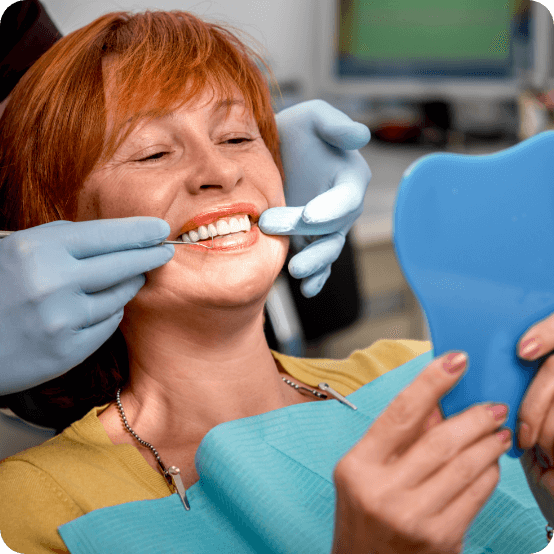
Dental implants are a treatment designed to replace missing teeth. They are a revolutionary alternative to dentures and dental bridges, using small titanium posts that are surgically implanted into your jawbone. As you heal from surgery, the bone fuses to the posts, stabilizing the implants in your jaw. The posts are then used to support ceramic dental crowns, which are used to replace the visible portions of your missing teeth.
The 4-Step Dental Implant Process
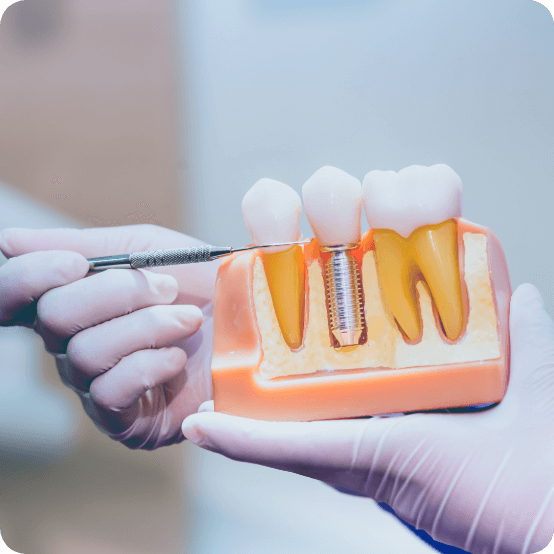
Dental implants are one of the most comprehensive and effective methods for addressing tooth loss, and they involve a multistep process to do this. In general, the entire procedure can take several months or even a year to complete, but the results can typically last a lifetime with proper care and regular visits to the dentist. During your consultation, our team can provide you with an estimate of the timeline so that you know what to expect. Until then, here are the four major steps of dental implant treatment.
Initial Dental Implant Consultation
First, Dr. Paskalev performs an exam, determines your candidacy for dental implants, and walks you through what to expect throughout treatment. He’ll want to know how many teeth need to be replaced, as this can influence the type of restoration that’ll be best for you. He’ll also need to ensure that you’re free of any underlying issues that can cause problems or even failure, such as gum disease and insufficient jawbone density. If he does find anything, he’ll provide the necessary treatment to get you back to oral health. Once he’s confirmed that you’re ready for dental implants, we can review the details of your procedure, such as the timeframe and cost.
Dental Implant Surgery
After your initial consultation, we’ll pencil you in for surgery at a later time. Fortunately, our practice can perform the entire process in-house, so you can receive care with a team you already know and trust. Once you’ve arrived for your treatment, we’ll make incisions in your gums, exposing the jawbone. Next, tiny holes are drilled into the bone, and the titanium posts are inserted inside. Finally, your gums are stitched closed around the posts. We’ll also cover the implant with a protective cap so that it remains safe as you recover.
Dental Implant Osseointegration & Abutment
Your healing period is essential for your dental implants as they’ll need to undergo a process called osseointegration. This is when the metal post will bond with the surrounding bone tissue to become the solid, stable foundation needed to support your restoration(s). The process of osseointegration can take about four to six months. Once you’ve fully healed, you’ll return to our office so we can place abutments (metal connectors) onto your implants. These will be the pieces that link your new teeth to your posts. We’ll take impressions of your smile to use for fabricating your restorations while your gums recover over several weeks.
Delivery of Dental Implant Restoration(s)
Once you’ve healed properly, you’ll come to us for the final stage of your treatment. This appointment will involve anchoring your new crown, bridge, or partial/full denture atop your dental implants. We’ll also take the time to ensure your bite is correct and comfortable, that you’re satisfied with the results, and to respond to any questions you might have for us. If all is well, you’ll be free to go out and enjoy your fully rebuilt smile!
Benefits of Dental Implants

In basically every way, dental implants stand out from traditional tooth replacements. They look and feel completely natural and function just like real teeth. As a result, they are able to offer several significant benefits that normal dentures or bridges simply can’t, including unmatched comfort and stability.
Day-to-Day Benefits
If you have worn dentures for any amount of time, you know that they involve special care and maintenance. On the other hand, implants are easy-you just have to brush and floss them like real teeth! Also, knowing that your prosthetic teeth are secure can help you have more self-esteem and enjoy a substantially higher quality of life every day. Plus, you never have to think twice about what you want to eat.
Health Benefits
With traditional dentures, the bite becomes significantly weaker. In fact, research indicates that only about 25 percent of the original biting force is restored with dentures. In contrast, dental implants can restore up to 75 percent of biting strength. With a stronger bite, you can eat raw fruits and vegetables, which are more nutritious than easy-to-chew, highly-processed foods that have a lot of calories but don't help you feel full. Whole grains and lean meats are also easier to eat with stable teeth. As a result, you can have a better-balanced diet and better overall health.
Long-Term Benefits
Unlike normal dental bridges and dentures, dental implants are a long-term solution. They do not need to be replaced nearly as frequently as these other options. In fact, you could consider them permanent! Also, with tooth loss, the jawbone loses density when it’s no longer stimulated by tooth roots. That’s why so many people who have lost teeth have a sunken look. However, dental implants keep this bone tissue growing, which means you also keep a more youthful facial shape year after year.
Who Dental Implants Can Help

Dental implants in Eugene can help patients at all stages of tooth loss, including those who don’t have any of their natural teeth left. So, if you are ready to have a complete smile and a strong bite again, don’t hesitate to schedule a consultation with us! In the meantime, you can read on to learn more on the topic, starting with the qualities we look for in a good dental implant candidate.
Who Is a Good Candidate for Dental Implants?

The main prerequisites for the treatment are:
- Good oral health
- A strong jawbone
- A commitment to healthy habits
- A willingness to break bad habits, like smoking
The good news is that, even if you don’t initially meet these criteria, Dr. Paskalev can often provide the right preparatory procedures. So, don’t get discouraged – having a healthy, beautiful, and complete smile isn’t out of reach forever!
Missing One Tooth
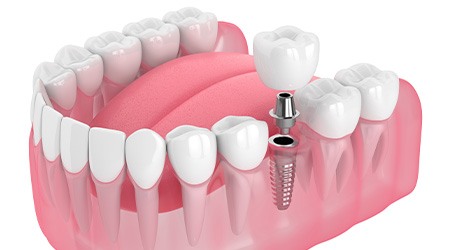
If you’re missing only one of your teeth, we have good news: we can replace it without altering the surrounding, healthy ones! If we decide together that this is the best tooth-replacement solution for you, then Dr. Paskalev will vertically position a single implant post into the empty space and use it to support a dental crown. As we mentioned, this doesn’t require us to modify the structure of the adjacent teeth. Plus, since each dental crown is custom-made, yours will match the surrounding teeth, ensuring it looks as natural as it feels.
Missing Multiple Teeth
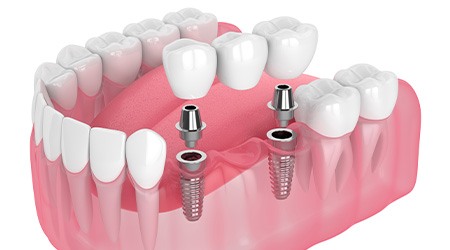
If you’re missing several teeth along an arch, then we can secure a partial denture onto a small number of strategically placed implants. We can even bring back multiple missing teeth in a row by placing one implant at each end of the gap and anchoring a custom dental bridge onto them. In addition to being much more stable, implant bridges are more realistic and conservative than traditional ones. With the proper care and maintenance, they can last significantly longer, too!
Missing All Teeth
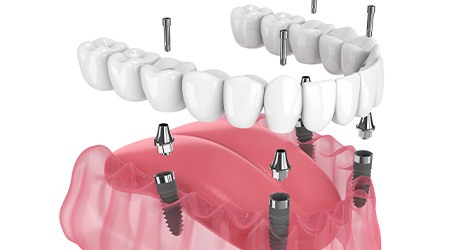
If you don’t have any of your natural teeth left, dental implants are still an option! With as few as four to eight, we can support a full denture that restores an entire row of teeth. Whether we create a brand-new prosthetic or retrofit your current one to attach to implants, you can have peace of mind knowing that your implant denture will provide greater biting strength and stay more firmly in place than a regular denture could ever hope to.
Understanding the Cost of Dental Implants

Dental implants are able to offer incredible durability and realism to patients, owing to the sophisticated materials and surgical techniques involved in placing them. While these factors contribute to the success of the treatment, they also factor into its price.
We want you to be prepared for every single aspect of dental implants, including what it will cost you financially. While we’ll give you an estimate for what exactly your care will cost when we meet you in person, there are some things that you can learn about the price of dental implant if you want to budget for care ahead of time.
Preliminary Treatments & Dental Implant Surgery
One factor that’s important to consider is any preliminary treatments that could precede the actual placement of dental implants. Gum disease therapy, tooth extractions, or bone grafting will contribute to what your overall treatment will cost. Thankfully, many of these treatments will be at least partially covered by insurance.
Then there’s the price of the surgery itself. We will be able to complete each aspect of the dental implant process in-house, meaning that there shouldn’t be any surprises when it comes to what that procedure will cost.
The Parts of Your Dental Implant
These procedures make up a lot of the price of dental implant placement, but there’s also the matter of the implant itself. The number of dental implants you’re getting and the material that they’re made from will also contribute to the cost of care. Then there’s the restoration that will go on top of your implant; generally dentures and bridges will be more expensive than crowns.
We’ll help you to navigate each of these choices when we meet you, allowing you to balance your needs with the cost of your treatment.
How Dental Implants Can Save You Money
While dental implants are often more expensive than other methods of replacing teeth, it’s also true that they could potentially save you a lot of money in the long run. This is because dental implant routinely outlast other methods of tooth replacement by a factor of two-to-one, with many enduring a lifetime before needing to be repaired. In the long term, you’ll find that the investment you make in your dental implant will likely pay dividends well into the future.
Does My Dental Insurance Cover Dental Implants?
Dental implants’ popularity is relatively recent, which means that many insurance companies are still wary to cover them as a restorative treatment. However, things are rapidly changing in that regard, meaning that it’s certainly possible that you could get coverage for your treatment. We will help you work with your dental plan in order to ensure that you get the most of your benefits.
Making Dental Implants Affordable
If dental implants aren’t going to be covered by your insurance company, we have other alternatives that can make the cost of your dental care more affordable. We work often with CareCredit and Cherry, which are financing firms that can front to cost of care for patients who qualify. This would allow you to gradually pay off your treatment over the course of several months, often with little-to-no additional interest. If you’re curious about this or any other financial option, give us a call and we’ll be happy to talk to you about them.
Dental Implants Post-Op Instructions

At College Hill Dental, our team can perform the entire dental implant process under one roof, meaning you won’t have to worry about traveling across town to get your treatment done. This also means you can save more time and money while rebuilding your missing teeth. After placing your metal posts into your jawbone, we will provide you with specific guidelines on how to care for your smile while you recover. Here are some of the usual post-op instructions you’ll want to follow once you’ve received your dental implants.
What to Do Directly After Dental Implant Surgery
Perhaps the most important part of your recovery is to allow the blood clot to form around your dental implant without disturbing it. This means you’ll want to refrain from touching your posts and gums until you’ve healed entirely. Furthermore, you’ll want to follow these general rules:
- No drinking from a straw
- No smoking or chewing tobacco products
- No touching the surgical site with your fingers or tongue
Common Side Effects When Recovering from Dental Implant Placement
For most oral surgeries, you’re bound to experience some level of discomfort or soreness in your mouth. Common side effects also include swelling and intermittent bleeding, which will simply need to be managed with clean gauze and a cold compress (to reduce inflammation). While these symptoms should gradually fade away, here are several ways to control your side effects:
- Apply gentle pressure with a clean gauze to manage bleeding
- Place a cold compress on your cheek to minimize swelling
- Take over-the-counter/prescribed pain relievers to alleviate discomfort
If any of your symptoms persist after several days or worsen over time, notify our team immediately for help.
Your Diet After Dental Implant Surgery
Since you’ll need to avoid disturbing your surgical site, your diet will mainly consist of foods that are soft and don’t require much chewing. Over time, as your gums recover, you can begin to introduce more solid foods while still avoiding your dental implant. In the meantime, be sure to stock up on softer food choices, such as:
- Mashed potatoes
- Scrambled eggs
- Yogurt
- Pudding
- Pasta
- Soups and broths (that aren’t hot)
- Ice cream
Post-Op Health & Oral Hygiene
After undergoing your placement surgery, you’ll need to ensure your mouth remains as clean as possible to avoid any complications from arising. This will also allow your dental implants the best chance to successfully integrate with your jawbone for the maximum support your new teeth will need. Here are a few tips to follow:
- Rinse your mouth carefully with salt water 2-3 times daily, especially after eating. Let the water pour from your mouth instead of spitting it out.
- Brush your teeth normally 24 hours after your surgery, but avoid touching the surgical site.
- Avoid mouthwash consisting of alcohol that could cause discomfort.
What to Do After Your New Teeth Are Attached
Once your dental implants have properly fused with your jawbone and you’re completely recovered, you’ll return to our office to receive your new dental crown, bridge, or denture. Your gums may feel somewhat sensitive after getting your restoration attached, but this can be easily managed with painkillers. Should you notice any bleeding or swelling afterward, notify our team so we can treat the issue.
Maintaining & Caring for Your Dental Implants

Dental implants can allow you to enjoy a complete and healthy smile for the rest of your life, but they require proper care to stay attractive and strong. Without the appropriate hygiene and maintenance, your implants may be lost and need replacement due to injury or infection. Luckily, they only require the same hygiene routine as real teeth to stay in great shape for life! Here’s a closer look at how you can take a proactive approach toward maintaining your dental implants, or feel free to contact us to learn more about caring for your new smile.
Make Oral Hygiene a Priority

Even though dental implants are impressively resilient, they still require proper oral hygiene to maintain their appearance and function. Without proper care and cleaning, infections like gum disease can compromise your implants and cause them to fail. An excellent daily oral hygiene regimen includes brushing at least twice as well as flossing and using antibacterial mouthwash. By keeping up with these habits, you can set implants up to look great and work well for decades.
Eat a Healthy Diet

While you can eat whatever you want with dental implants, it’s important to eat a balanced diet of nutritious foods to keep them healthy and secure. Indulging too much in hard, crunchy, chewy, or sticky foods can damage your implants, and sugary foods can feed the harmful oral bacteria that cause nasty infections. Water makes an excellent alternative to sugary beverages that can lead to gum disease. Taking care to get plenty of calcium and vitamin C can help maintain healthy gums and jawbones so your implants can last for as long as possible.
Break Bad Habits

There are a few common habits that can cause damage to your dental implants or lead to their failure. Tobacco use is one of the most frequent reasons behind the loss of a dental implant because it contains noxious chemicals that make your gums recede and make it harder for them to heal and fight infection. Using your teeth as tools or chewing on non-food items can also cause chips or cracks in your implants. Quitting smoking and abstaining from using your teeth for tasks like opening packages or bottles can help you maintain beautiful implants for life.
Protect Your Dental Implants

While dental implants are made from durable materials, they are not indestructible, and it’s important to take the proper precautions to protect them from harm. If you play contact sports or enjoy riding your bike, wearing a sports mouthguard can protect your implants and teeth during these activities. If you suffer from bruxism, a condition that causes patients to grind their teeth and clench their jaws at night, a custom-made nightguard can be used to protect your mouth and dental implants from unnecessary damage.
Schedule Regular Dental Checkups

You’ll still need to have exams and cleanings at least twice a year after getting dental implants. Scheduling regular visits at our office allows Dr. Paskalev to evaluate your oral health, catch problems in their early stages, and advise you on how to prevent further issues from developing. Seeing us every six months or as recommended is a crucial part of keeping your implants beautiful and in working order for life.
Dental Implant Failure and Salvage
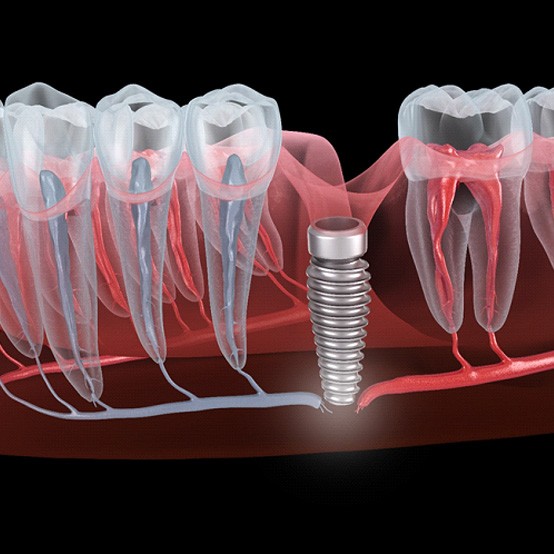
Since we’re able to place dental implants in-office, we’re also in a position to help if something goes wrong with your new teeth. Call us immediately if your dental implants come loose or are causing you pain. Once you get to our office, we will carefully examine your mouth to figure out what the problem is. Then we will explain what treatment options are available. Depending on the circumstances, your dental implants might need to be removed so that the underlying issue can be dealt with; the posts can potentially be replaced afterward.
Learn More About Dental Implant Failure and Salvage
Dental Implant FAQs

Are you struggling with tooth loss and want an effective way to restore your smile? One of the best solutions for this is dental implants. While they provide numerous benefits for preserving your oral health, you may still want to know as much as possible about the treatment before committing to it. For this reason, our team at College Hill Dental has collected several commonly asked questions we get from our patients about dental implants to make it easier for you. Feel free to reach out to us if you don’t see the specific answers you’re looking for!
Does Getting Dental Implants Hurt?
Dr. Paskalev will make sure to numb your mouth with a local anesthetic to keep you comfortable and pain-free before starting your dental implant procedure. Though you may not feel much or any discomfort during the surgery itself, you might feel mild soreness for the following few days. This can be easily managed by applying a cold compress to the outside of your mouth and taking over-the-counter pain relievers. However, if any discomfort worsens or persists for too long, you should visit us as soon as possible.
How Long Do Dental Implants Last?
While the exact lifespan of your dental implants can vary, you can typically expect them to last you for three decades or more with proper care. Several factors that can influence their longevity include maintaining good oral hygiene, avoiding bad habits (like smoking, chewing on ice, and using teeth as tools), and visiting our team for routine checkups and cleanings. By practicing preventive care, you can make the most of your new pearly whites for a lifetime!
Will I Have to Take Off Work for Dental Implant Surgery?
Many patients generally need to take only a day or two off from work to undergo their dental implant procedure. This can vary from patient to patient, as the amount of time you’ll need for your treatment will depend on your specific circumstances. You might especially need three to four days off work if your job is physically demanding. This is because strenuous exercise can divert blood away from the implant site, disturbing the blood clot forming and interfering with your recovery process.
What Can Cause Dental Implants to Fail?
Two of the most common reasons for dental implant failure are failed osseointegration and peri-implantitis. Osseointegration is the process where the metal post bonds with the jawbone tissue. This will allow the implant to act as the new permanent root, directly anchoring your restorations for many years to come. If unsuccessful, it can lead the implant to loosen or be unstable. Peri-implantitis is a kind of gum infection that happens from poor dental hygiene, damaging the soft tissue and jawbone. Dental implant failure can also be due to taking certain medications, chronic teeth grinding, diabetes, and even cancer.





